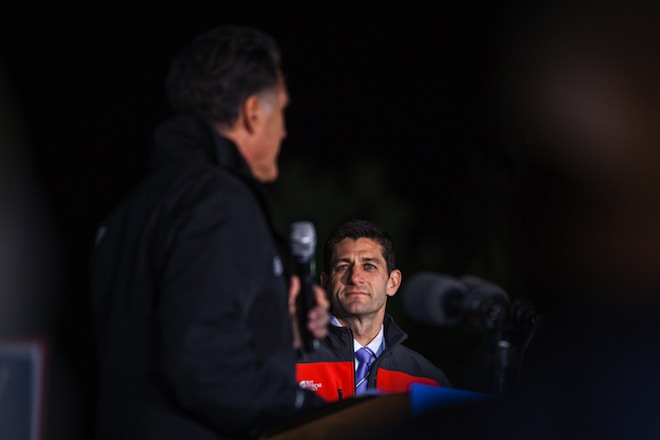Immediately after Democrats won the 2012 election last November the biggest story in politics became, What will Republicans do next?
Then despite the fact that the campaign was fixed around fiscal and economic policy issues — and more broadly the question of how the government should allocate resources for middle class taxpayers and senior citizens — It became apparent pretty quickly that Republicans believed they could regroup without revisiting the consensus on the right that the relationship between citizens and the government needs a radical overhaul.
Instead their basic strategy has been to adopt moderate views on other issues. To draw enough minority and single women voters into the party at the margin to become nationally viable again without abandoning certain precepts: low marginal tax rates for the wealthy and big corporations, reduced benefits for middle class workers, dramatically reduced benefits for the poor, and privatization of public services.
That was the basic trade off we identified, and we’ve been monitoring it closely for the past few months because it’s essentially a surface-level manifestation of, again, the biggest story in politics. What’s the GOP gonna do?
But in case there’s any doubt about the nature of the tradeoff itself, the new House Republican budget should put it to rest.
The key fact about this GOP budget is that the differences between it and the last GOP budget — and to a lesser extent between it and the Romney/Ryan plan — are so trivial they’re hardly worth belaboring.
Like his previous budgets, Paul Ryan’s new budget pockets Affordable Care Act savings and revenue as well as revenue from the fiscal cliff tax deal and nominally devotes them to deficit reduction.
However, as in previous budgets, he proposes scrapping the existing progressive income tax rate structure in favor of a system with two-brackets, without identifying how he’d broaden the revenue base. Specifically, he drops the top marginal rate dramatically from 39.6 percent to 25 percent, which is a huge boon to people with high incomes, but pretty meaningless if you’re in the middle class.
As in previous budgets, he doesn’t identify which tax expenditures he’d limit or eliminate to make his overall tax reforms revenue neutral, but as we learned during the presidential campaign, we know this likely means a middle-income tax increase.
As in previous budgets he calls for turning Medicare into a voucher program, but only after 10 years, so that current seniors — who of course are overwhelmingly Republican but overwhelmingly support Medicare as it is — are held harmless
As in previous budgets he repeals the rest of the Affordable Care Act.
As in previous budgets he calls for cutting Medicaid spending by an enormous amount and turning it into a block grant program to be administered by the states.
As in previous budgets he proposes huge but unidentified cuts to other domestic programs, which by and large benefit the poor and middle class.
The savings from these cuts would be used in part to turn off sequestration for defense spending only. The rest would be used to balance the budget.
That’s why I called it new budget, same as the old budget. Today’s a day for congressional reporters in Washington to dust off the stories they wrote last March, plug in a few updated numbers and treat it as a big news event.
But really the news is that there’s nothing new here. The budget was the GOP’s big opportunity to tell the public what they plan to change, and what they’ve come back with is: hardly anything.
Now it’s true that most GOP leaders no longer labor under the misapprehension that any of this will become law in the near future. In a real way the whole thing is a sop to rank and file conservatives who haven’t come to grips with that reality. And if Republicans think they can mollify the right with a platonic version of the Ryan budget and then pivot quickly to other issues and avoid becoming defined once again by the values that budget lays out, they’re free to try.
But I think this is all much more likely to reinforce bad habits than satisfy conservatives and allow the national party to turn to other issues. There’s a very short line connecting the Republican budget and the view that half the people in the country are takers, lulled into complacency by liberal safety net policies. If the GOP rank and file feels it needs to pass a budget like this to satisfy its ideological cravings, then it’s a safe bet that attacks on “the 47 percent” and similar faux pas will return in coming campaigns.
I may be wrong, but I don’t think cosponsoring a comprehensive immigration reform bill will do much of anything to repair the damage the GOP continues to do to itself by not shaking that habit.






